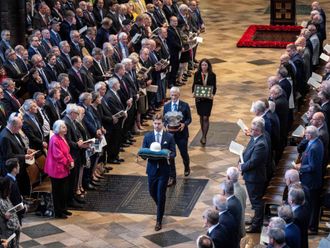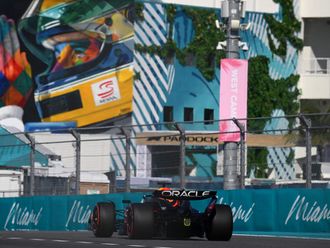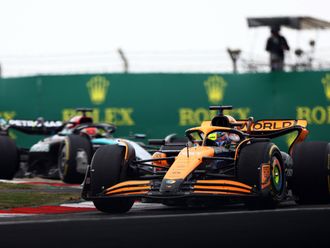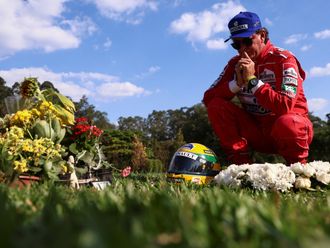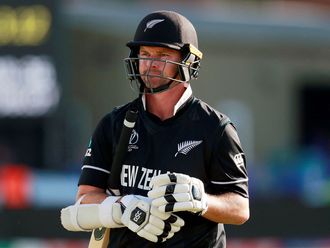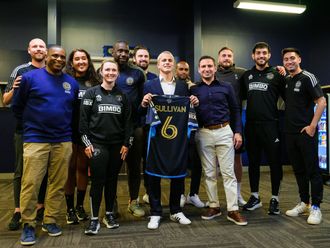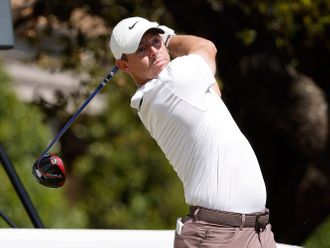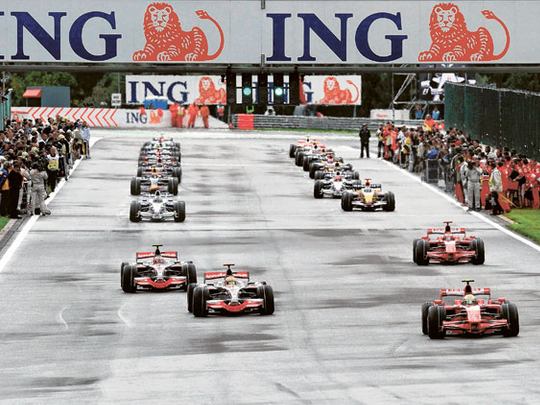
Abu Dhabi: When those five lights over the grid go out to signal the start of the Abu Dhabi Grand Prix, the finger on the switch will be Charlie Whiting's.
And from that moment on, for at least the ensuing action-packed 90 minutes, there will be no let-up and not a split second of relaxation for the 59-year-old.
Never heard of him? Well, the silver-haired Whiting has probably the most intensively high-pressure job of anybody on the frantic Formula One scene.
And his personal preference is to stay clear of the limelight, dodging any ego-tripping and getting on with the arduous task of ensuring the smooth, untroubled running of each of the 19 grands prix.
Multi-tasker
Put quite simply, his multi-tasking responsibilities are for the start procedure, the circuit, its safety, the fair play of the drivers, the obedience of the teams to the rules and regulations and the progress, or otherwise, of a race, its stoppage or continuance.
In short — he's the guvnor. Like most characters at the forefront of F1, Whiting is besotted and committed to the event and ensuring it is a spectacle for its worldwide audience.
Officiating at a grand prix can be a headache, with problems to test the most tidily-minded and calm individual, but I cannot recollect a single moment of indecision or panic from the man in the light blue shirt and navy blue trousered uniform of the FIA, the sport's ruling body.
Multi-million-pound missiles of cars driven by adrenaline-fuelled rivals in the tightest of situations at 200-plus mph should be a recipe for disaster.
Above board
But it is up to Whiting to make sure that the action is all above board — not only on the track but behind the scenes in the garages, where rule-bending chicanery can, and has been, a problem for all but the most alert of the likes of the race director.
His affection for the sport began when he was 12, when he smuggled himself into Brands Hatch, the closest race track to London, for the 1964 British Grand Prix — and from then on he was hooked.
When he was old enough, he became a mechanic for his racing driver brother Nick, later the British touring car champion.
He and Nick moved up from touring cars to F5000, where they prepared a Surtees for curvy Divina Galica, the Olympic skier turned F1 driver. In 1977 Whiting was poached by Lord Hesketh, owner of the rascally and high-living James Hunt's team — but it was an outfit very much in decline.
Breakthrough
His crucial breakthrough to the big time came when F1 ringmaster Bernie Ecclestone persuaded him to join the Brabham team he had just bought and, by the age of 29, he was chief mechanic on championship-winning Nelson Piquet's car. A second title followed a year later — in 1983 — and he was promoted to chief engineer.
A year before Ecclestone sold the team in 1988, Whiting became the FIA's chief scrutineer, a job essentially to detect the sport's cheats — and he was on his way to the very pinnacle of the sport.
Unstinting devotion
It took nine years of unstinting devotion before he was elevated to his current role as FIA race and safety director, a high intensity and heavily-scrutinised position. In between times he had to cope with the tragic loss of his beloved brother Nick, kidnapped and murdered after a gangster raid on his motor showroom.
Nowadays he roams the world on a mission of crucial importance to F1, sanctioning new circuits, suggesting improvements and offering advice and then overseeing the on-track grand prix action.
He confesses he does not do the job anticipating any praise, nor does he seek any.
"While I would never expect anybody to come up to me after a grand prix and tell me it was a really well-run and organised event, if I don't get anybody complaining about something then it is very nice," he said.
Satisfaction
And he added: "You do get a certain amount of satisfaction from coping with difficult situations because sometimes it is not all that easy and straightforward. And you have to use your common sense and rely on your experience.
"For instance, if we need to use the safety car, say, four times during a race, you've got to have your wits about you. One gets great satisfaction out of knowing you have done a decent job — and if nobody comes complaining then that is usually the yardstick."
Median line
His remit extends beyond the grand prix weekend show.
He is also chairman of the technical and working groups and supervises the sport's regulations — to most of us another unenviable responsibility — and he has to appease all the teams while trying to find a median line to progress the spectacle.
All rolled into one, he is an umpire, a safety inspector and adviser, scrutineer, exposer of underhand tactics, engineer, politician and peacemaker. And one of the nicest guys in Formula One.
As he says: "If you don't hear my name all season it means I must be doing a good job." Dead right.
Ted Macauley is a motor sports expert based in London.


